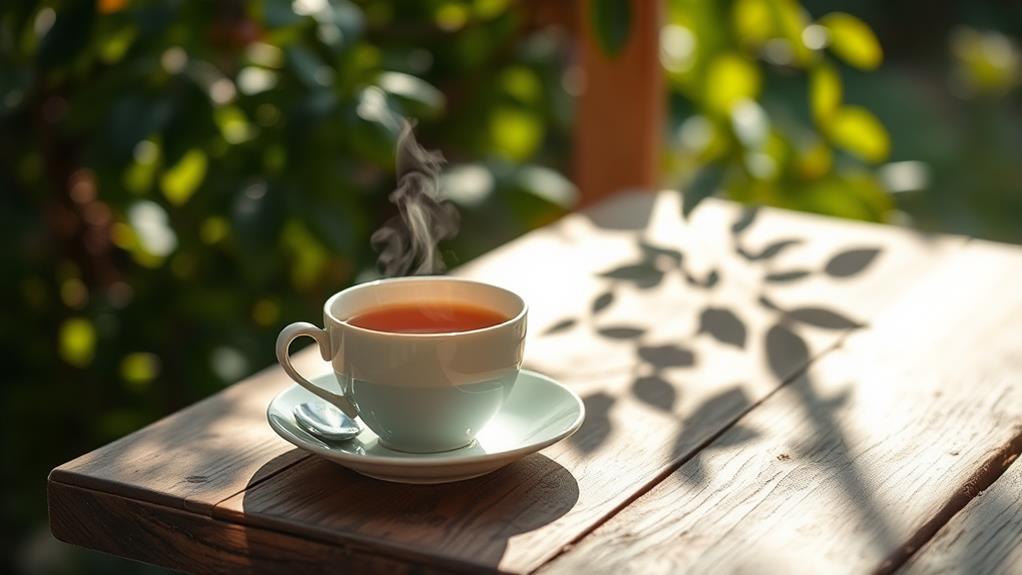You add sugar to your tea mainly because it enhances the flavors, making each sip more enjoyable. Since the 17th century, sugar has been blended with tea across cultures—from sweet chai in India to mint tea in Morocco—creating strong social bonds. It gives your drink a smoother mouthfeel while highlighting the tea's natural notes, like floral or fruity flavors. However, moderation is key since too much sugar can overshadow tea's health benefits. And, if sugar's not your thing, there are tasty alternatives worth trying. Stick around, and you'll discover even more about sweetening your tea!
Historical Context of Sugar in Tea
Although tea has been enjoyed for centuries in various cultures, sugar's introduction transformed its consumption markedly. When sugar began to make its way into tea, it wasn't just a matter of taste; it was a revolution in how people experienced this beloved beverage. Imagine sipping a warm cup, and then discovering a sprinkle of sweetness that elevates the entire experience!
The popularity of sweetened tea can be linked to the broader context of colonial trade, where items like tea and sugar became symbols of economic power and social status, much like the Boston Tea Party demonstrated colonial resistance to British control.
The journey of sugar in tea started in the 17th century when it arrived in Europe from the Caribbean. People began experimenting, and soon enough, sweetened tea became a fashionable drink among the elite. This new trend caught fire, leading even the working class to embrace sugar in their daily brews. It wasn't just about flavor—sugar also came to symbolize wealth and status.
As sugar spread across continents, it merged with local customs, creating unique blends and rituals. In many ways, you can think of sugar as a bridge, connecting cultures and encouraging innovation in tea-making.
Cultural Significance of Sweetened Tea
Sweetened tea holds a special place in various cultures around the world, reflecting both tradition and personal preference. For many, adding sugar transforms a simple cup of tea into a comforting ritual, enhancing the overall experience and enjoyment of the beverage.
In places like India, chai tea, with its sweet and spicy blend, symbolizes hospitality. When you visit someone's home, offering sweetened chai is a warm welcome.
In the Middle East, sweetened tea is often served during social gatherings, creating a sense of community. It's not just about the drink; it's about connection. You'll find that in countries like Morocco, mint tea is a sign of friendship and generosity, with sugar sweetening the experience.
This aligns with tea's ability to promote relaxation and enhance mental wellness, making shared moments even more special the ritual of tea drinking.
In contrast, in some Asian cultures, sweetened tea is part of a celebration. It's common at weddings or festivals, where sharing a sweetened brew signifies joy and good fortune.
Even in Western cultures, sweetened iced tea has become an invigorating staple during summer picnics. It's more than just a taste; it's a way to enjoy moments with loved ones.
Taste Preferences and Balance
When you take a sip of tea, the balance between sweetness and the tea's natural flavors plays an essential role in your overall experience. You might find that adding sugar enhances your enjoyment, transforming the drink into something extraordinary.
Think about how sweetness interacts with the tea's unique characteristics, creating a delightful harmony on your palate. Additionally, the unique health properties of different teas can further influence how sugar complements their flavors.
Here's what you might consider when finding that perfect balance:
- Flavor Enhancement: Sugar can elevate the tea's inherent notes, bringing out floral, fruity, or earthy undertones.
- Personal Preference: Everyone's taste buds are different. Experimenting with sugar levels helps you discover what you truly enjoy.
- Texture and Mouthfeel: The sweetness can create a smoother, more luxurious feeling as you sip your tea, making the experience more satisfying.
Health Perspectives on Sugar
While enjoying the perfect balance of sweetness in your tea, it's important to contemplate the health implications of adding sugar. Sugar can transform your drink, but it also brings along some health considerations. When you add sugar, you might be boosting not just the flavor, but also your calorie intake.
Tea itself offers exceptional health benefits, rich in polyphenols that reduce the risks of chronic diseases, so enhancing it with sugar might overshadow these advantages. Too much sugar can lead to weight gain, increased risk of diabetes, and even heart problems down the road.
Now, we all know that moderation is key. A teaspoon or two mightn't seem like a lot, but it's easy to lose track, especially if you're savoring multiple cups. Think about how often you reach for that sugar bowl!
There's also the impact on your teeth. Sugar can feed the bacteria in your mouth, which produces acid and leads to cavities. No one wants a dental visit to ruin their tea time!
Alternatives to Sugar in Tea
If you're looking to cut back on sugar without sacrificing flavor, there are several fantastic alternatives to contemplate for your tea. These options can enhance your experience while keeping things innovative and fun!
Incorporating these alternatives can also complement the health benefits of tea, ensuring that you enjoy both flavor and wellness in every sip.
- Honey: This natural sweetener adds a unique flavor to your tea and packs a punch of antioxidants. Plus, it's sweeter than sugar, so you might need less!
- Stevia: Derived from the leaves of the stevia plant, this zero-calorie sweetener offers a sweet taste without the guilt. It's a great choice for those watching their calorie intake.
- Maple Syrup: A delightful twist, maple syrup brings a rich, earthy sweetness to tea. It's also packed with minerals and vitamins, making it a tasty and nutritious option.
These alternatives not only reduce sugar but also add distinct flavors to your cup.
Don't be afraid to experiment! Whether you're sipping a classic black tea or a herbal infusion, trying out these substitutes can lead to delightful surprises.
FAQ
How Does Sugar Affect the Aroma of Tea?
Sugar can enhance tea's aroma by balancing bitterness and elevating sweetness. You'll notice richer, more complex scents as sugar interacts with tea's compounds, creating an inviting experience that transforms your perception and enjoyment of each cup.
Can Sugar Enhance the Color of Tea?
Yes, sugar can enhance the color of tea. When you add sugar, it interacts with the tea's compounds, potentially intensifying the hue and creating a visually appealing drink that elevates your overall experience.
What Is the Best Sugar Type for Green Tea?
When choosing sugar for green tea, consider using cane sugar or honey. They're natural, enhancing the tea's flavor without overpowering it. Experiment with different amounts to find your perfect balance of sweetness and freshness.
How Does Sugar Influence the Caffeine Absorption in Tea?
You might imagine a dance between sugar and caffeine, where sugar slows absorption, creating a smoother energy release. This can lead to a more balanced experience, allowing you to enjoy tea's stimulating effects without overwhelming jitters.
Are There Any Myths About Sugar in Tea?
You might hear myths claiming sugar alters tea's health benefits or flavors greatly. In reality, sugar enhances sweetness without substantially changing nutritional value. Embrace experimentation to discover the perfect balance that suits your taste!
Final Thoughts
So, the next time you sip your tea, remember you're part of a sweet tradition! Did you know that in the 18th century, the British consumed about 300,000 pounds of sugar annually in their tea? That's a lot of sweetness! While adding sugar can enhance flavor and create a comforting experience, you might also explore healthier alternatives. Whether you prefer your tea sweet or not, it's all about what makes you enjoy that warm cup in your hands!



